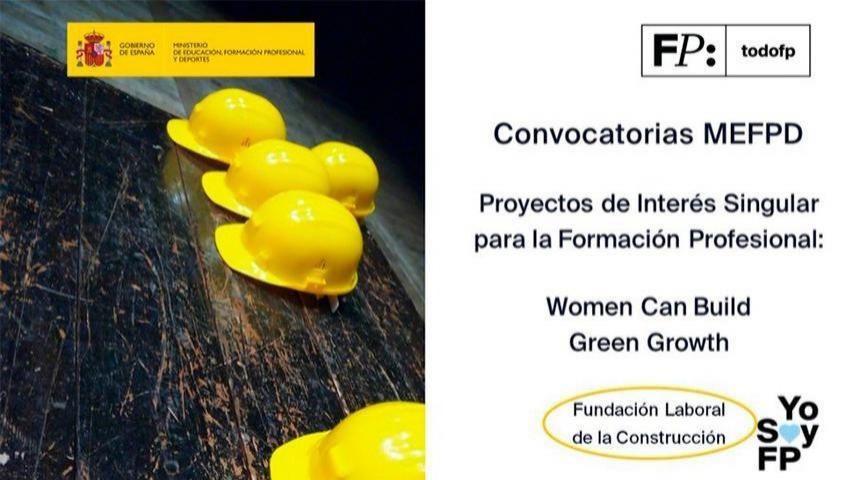The Ministry of Education and Vocational Training recognises FLC for its coordination of projects ‘of singular interest for VET'
The ‘Women Can Build’ and ‘Green Growth’ projects are recognised for their singular interest for Vocational Training, which is ‘an indispensable part of a productive model that intensifies the processes of value creation and quality employment’.
The Ministry of Education, Vocational Training and Sports, through the Secretary General of VET, has published a decision recognising the projects of Fundación Laboral de la Construcción ‘Women Can Build’ and ‘Green Growth’ as ‘projects of singular interest for Vocational Training’, considering that ‘within the scope of their social responsibility, they carry out studies and develop training projects, whose design is excellent and could serve as a reference for training actions carried out by other companies and even by the administrations, which would result in a substantial improvement of the Vocational Training System’.
Both initiatives co-funded by the Erasmus+ programme and coordinated by Fundación Laboral de la Construcción, are aligned with the Sustainable Development Goals (SDGs) of the 2030 Agenda, specifically: SDG5. Gender Equality; SDG7. Affordable and clean energy; and SDG13. Climate action.
The ‘Green Growth’ project launched a strategy to address the challenge of the circular economy in the construction sector and its VET centers. The initiative has provided teaching materials for VET trainers and tools for the improvement of information regarding the reuse and recycling of materials and waste management for SMEs and workers in the sector, thus improving the circularity of construction materials and contributing to a more sustainable sector and in line with actions against climate change.
In this way, and thanks to the 'Green Growth' project, Fundación Laboral de la Construcción was recognised by SEPIE's National VET Team for ‘the coordination of relevant projects in the fight against climate change and the environment'.
The ‘Women Can Build’ project, co- funded by the Erasmus+ programme, focused on re-envisioning Vocational Training towards an equal construction industry. The priority was to improve access to training for women by adapting the sector's training with a gender perspective and, in this way, to respond to the demand for labour. This adaptation, together with the implementation of job orientation measures and training, facilitated the access of more women to jobs in a male-dominated sector.
To continue with this objective, Fundación Laboral de la Construcción is coordinating the second edition of this project, this time focusing on the integration of women in the construction sector in Latin American countries, together with five other institutions from Spain, Italy, Chile and Argentina. In this way, through the ‘Women Can Build LatAm’ project, co-funded by the Erasmus+ programme, the aim is to transfer to Latin America the results and good practices in training and employability of the first edition.
Other Erasmus+ initiatives
Fundación Laboral de la Construcción is currently working on other initiatives co-funded by the European Union's Erasmus+ programme, which focus on improving training in the sector and making it more attractive to young people, women and other groups. An example of this are the projects:
- ‘Pact4Youth’ whose main objective is to act in favour of the employability of young people in the construction sector.
- 'BuildOffsiteEU' which promotes the (re)qualification of the construction workforce for the transition from traditional to industrialised (off-site) construction.
- 'Habitable' which through the Alliance of centres of excellence in Vocational Training seeks to respond to the challenges and needs of the Habitat sector in terms of skills and mismatches arising from the digital and green transition.
- 'CONCRETO' which focuses on the rehabilitation of European concrete heritage through a training school inspired by the Renaissance concept of “La Bottega”.
- 'Welcome Work‘ which facilitates refugees’ immediate access to training while empowering future construction professionals to create inclusive work environments.
- 'XR Energy' which aims to improve didactic tools for flexible and illustrative education and training in the field of energy transition.

Funded by the European Union. Views and opinions expressed are however those of the author(s) only and do not necessarily reflect those of the European Union or the European Education and Culture Executive Agency (EACEA). Neither the European Union nor EACEA can be held responsible for them.









